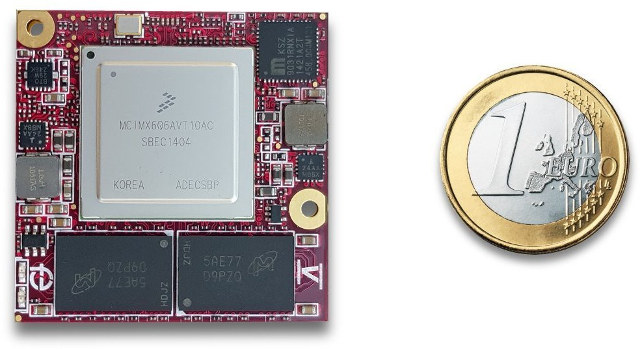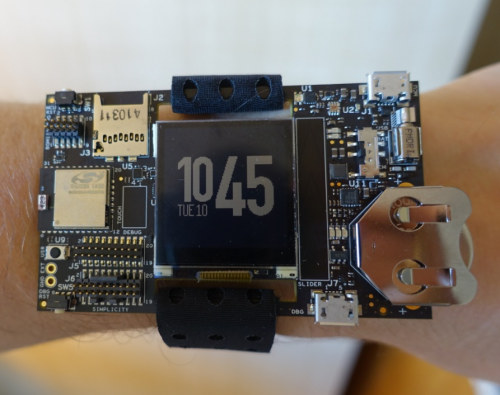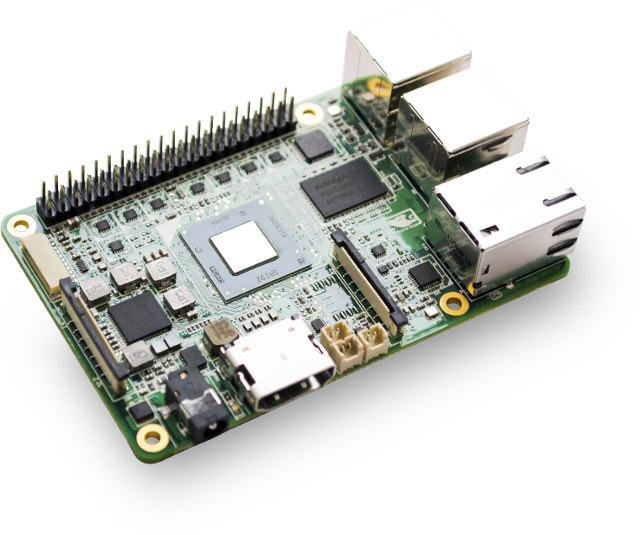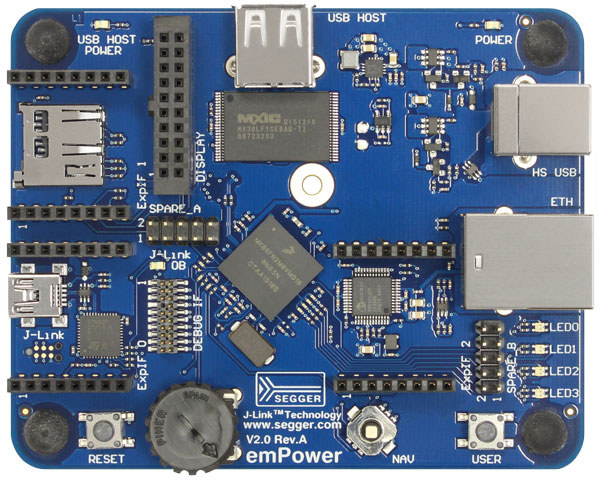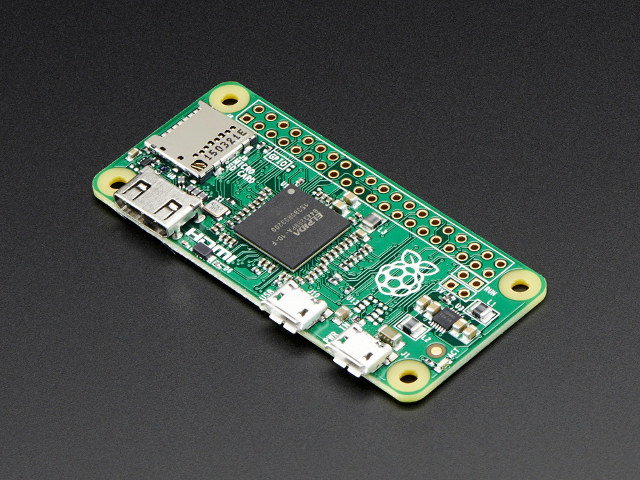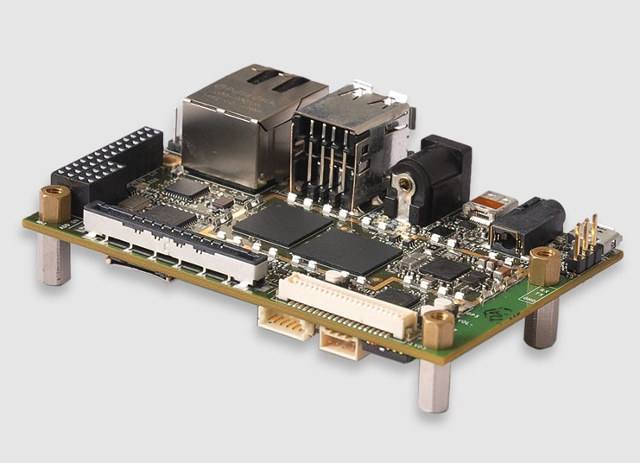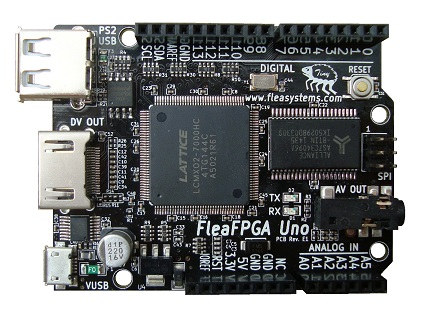A couple of years ago, I wrote about iMX6 Rex open source hardware project combining a Freescale i.MX6 SoM and baseboard that aimed a teaching hardware design (schematics and PCB layout). I had not followed the project very closely since then, until I watched a video showcasing HDMI input capabilities in Linux using the new version of the module and baseboard called i.MX6 TinyRex. i.MX6 Tiny Rex module specifications: SoC – Freescale iMX6 processor up to 1.2GHz and 4 cores System Memory – Up to 4GB DDR3-1066 (533MHz) Storage – EEPROM Connectivity – 10/100/1000 Mbps Ethernet PHY I/Os via 3 board to board connectors: Display / Video Output 1x HDMI (up to QXGA 2048×1536) 1x LVDS (up to WUXGA 1920×1200) 1x 20-bit parallel LCD display (up to WXGA 1366×768) or 1x Video Input (CSI) 1x MIPI DSI differential display output (up to XVGA 1024×768) Video Input 1x 20-bit parallel video input […]
Thunderboard Wear is a $75 Smartwatch Development Board by Silicon Labs
A few days ago I watched an ARMDevices.net’s video about an ARM’s smartwatch reference design running mbed OS 3.0, powered by a Silicon Labs EFM32 Giant Gecko Cortex M3 MCU, and promising up to 2 months battery life on a 160 mAh battery. While I could not find the full details about the reference design, I noticed Silicon Labs also launched a development board called Thunderboard Wear, based on the same platform, just quite bigger, and still wearable… (Sort of) Thunderboard Wear specifications: MCU – Silicon Labs EFM32GG995F1024 ARM Cortex-M3 MCU up to 48 MHz with 128 kB RAM,1 MB Flash External Memory – 256 kB external SRAM External Storage – micro SD card slot Display – 128×128 pixel Memory LCD from Sharp Connectivity – Bluetooth 4.1 smart module (Silicon Labs BGM111), upgradeable to Bluetooth 4.2 Sensors Ambient Light Sensing (ALS) and Proximity/Gesture via Silicon Labs Si1141. Optical hear-rate monitoring […]
Mediatek LinkIt Smart 7688 and Smart 7688 DUO Boards Run OpenWRT for IoT Applications
MediaTek LinkIt is a collection of development platforms designed for the prototyping of wearables and Internet of Things (IoT) devices, and last year they started with LinkIt ONE board based on Mediatek MT2501 “Aster” micro-controller and featuring WiFi, Bluetooth, GPSD and GSM/GPRS connectivity. Mediatek Labs has now launched two new LinkIt board, namely LinkIt Smart 7688 and LinkIt Smart 7688 DUO, both powered by Mediatek MT7688 MIPS processor and running OpenWRT, with the latter also adding an Atmel ATmega32U4 for Arduino compatibility. LinkIt Smart 7688 Board LinkIt Smart 7688 is then the simpler of the two with the following specifications: Processor – Mediatek MT7688AN MIPS24KEc processor @ 580 MHz with WiFi System Memory – 128MB DDR2 RAM. Storage – 32MB flash + micro SD slot Connectivity – 1T1R Wi-Fi 802.11 b/g/n with chip antenna and I-PEX conector USB – 1x micro USB host port, 1x micro USB port for power […]
UP Board Gets 2GB RAM and 32GB Storage Option, Linux Port in Progress
The UP Board is a Raspberry Pi like board with an Intel Atom processor that’s currently on Kickstarter with a few hours left, and it has just reached its 100,000 Euros stretch goal meaning that beside the 16GB storage / 1 GB version, a version with 32Gb storage and 2GB is now offered. The company also showed their progress with the implementation Debian based Ubilinux on the Intel Atom x5-Z8350 board. That means the specifications have now been updated: SoC – Intel Atom x5-Z8350 “Cherry Trail” quad core processor @ 1.44 GHz (Burst frequency: 1.84 GHz) with Intel Gen8 HD graphics @ 500 MHz System Memory – 1 GB or 2 GB DDR3L-1600 Storage – 16 or 32 GB eMMC Video Output / Display – HDMI, DSI connector Audio I/O – HDMI Connectivity – Gigabit Ethernet USB – 4x USB 2.0 host ports, 1x USB 2.0 pin header, 1x micro […]
Segger emPower is an embOS RTOS Evaluation Board with a J-Link OB Debug Interface
Segger, a company specializing in embedded software and hardware debugging tools, has recently launched Segger emPower, an evaluation board powered by Freescale Kinetis K66 Cortex M-4 MCU and including a J-LInk OB debug probe (JTAG/SWD), specially designed to evaluate the company’s embOS real-time operating system. emPower board hardware specifications: MCU – Freescale Kinetis K66 (MK66FN2M0VMD18) ARM Cortex M4F MCU @ 180MHz with with 256KB SRAM and 2MB flash memory Storage – 1Gbit NAND Flash + micro SD card connector Display I/F – 20-pin display adapter connector (5 V/3.3 V, SPI, PWM for backlight control) for small TFT displays Connectivity – Fast Ethernet USB – 1x USB device, 1x USB host (Full speed) Debugging On-board debug probe J-Link-OB with drag & drop (STM32F072, mini A/B-type connector); SWD/SWO only, no CDC/VCOM port support External debug interface (19-pin Cortex-M) including trace Expansion 3x Sensor Expansion Interface Devices (SExI) headers providing I2C, SPI buses, […]
Raspberry Pi Zero is a $5 Board Based on Broadcom BCM2835 Processor
The Raspberry Pi board had some serious competition price-wise with products such as Orange Pi PC, NanoPi, or even C.H.I.P, but the Raspberry Pi foundation has lowered the price barrier even further with the Raspberry Pi Zero board, based on the same processor as the original Raspberry Pi (model 1) boards but clocked at a higher speed, and in a much smaller form factor, and launching at an unbeatable price: $5. Raspberry Pi Zero specifications: Processor – Broadcomm BCM2835 ARM11 processor @ 1GHz with VideoCore IV GPU System – 512MB RAM Storage – microSD slot Video Output – mini HDMI port and composite video (via 2 unpopulated pins) USB – 2x micro USB OTG ports for data and power Expansion – 40-pin through-holes Power Supply – 5V via micro USB port Power Consumption – 0.5-0.7W (100-140mA at 5.09V) according to Raspi.TV Dimensions – 65mm x 30mm x 5mm The board […]
Inforce 6309 micro SBC is Software Compatible with DragonBoard 410c Board, Includes an Ethernet Port
I’ve recently written a review of DragonBoard 410c with Android, one of the first board part of Linaro’s 96Boards initiative that’s supposed to get Android and Debian distributions with recent Linux kernel & U-Boot, together with full source code. Inforce Computing has now launched Inforce 6309 micro Single Board Computer (SBC) with the same footprint, albeit different connectors’ placements, and software compatible with DragonBoard 410c development board powered by the same Qualcomm Snapdragon 410 processor. The board targets applications such as industrial automation, “sophisticated” IoE devices, medical devices, augmented reality computing, and robotics and drones. Inforce 6309 micro single board computer specifications: SoC- Qualcomm Snapdragon 410 (APQ8016) quad-core ARM CortexA53 @ 1.2 GHz with Adreno 306 GPU and Hexagon QDSP6 @ 700 MHz System Memory – 1GB LPDDR3 @ 533MHz, Single-channel 32-bit (4.2GBps) Storage – 8GB eMMC flash (eMCP package with RAM) + micro SD slot Video Output / Display […]
FleaFPGA Uno Board Combines a Lattice FPGA, Arduino UNO Form Factor, HDMI Output, and an ESP8266 WiFi Module
FPGA board with Arduino headers are not exactly a rarity, for example Digilent ARTY in a larger form factor, and some developers have designed FPGA boards using Arduino Mega form factor, such as Papilio DUO and Arduissimo. But FleaFPGA Uno is the first Arduino Uno like FPGA board I’ve seen and it includes HDMI output, one USB host port, as well as an optional WiFi module based on ESP8266. FleaFPGA Uno specifications: FPGA – Lattice Semi MachXO2-7000HC with 6864 LUTs, 256 Kbits flash, and 240+54 Kbits SRAM System memory – 512KB 10nsec User SRAM. Storage – 16MB User Flash ROM. Video Output 24-bit Digital Video out via HDMI port up to 800×600 Composite NTSC video via 3.5 mm jack Audio – Stereo audio out via 3.5mm jack. USB 1x micro USB port for power and slave serial port 1x USB 1.1 host port (PS/2 port) On-board USB JTAG for easy […]


